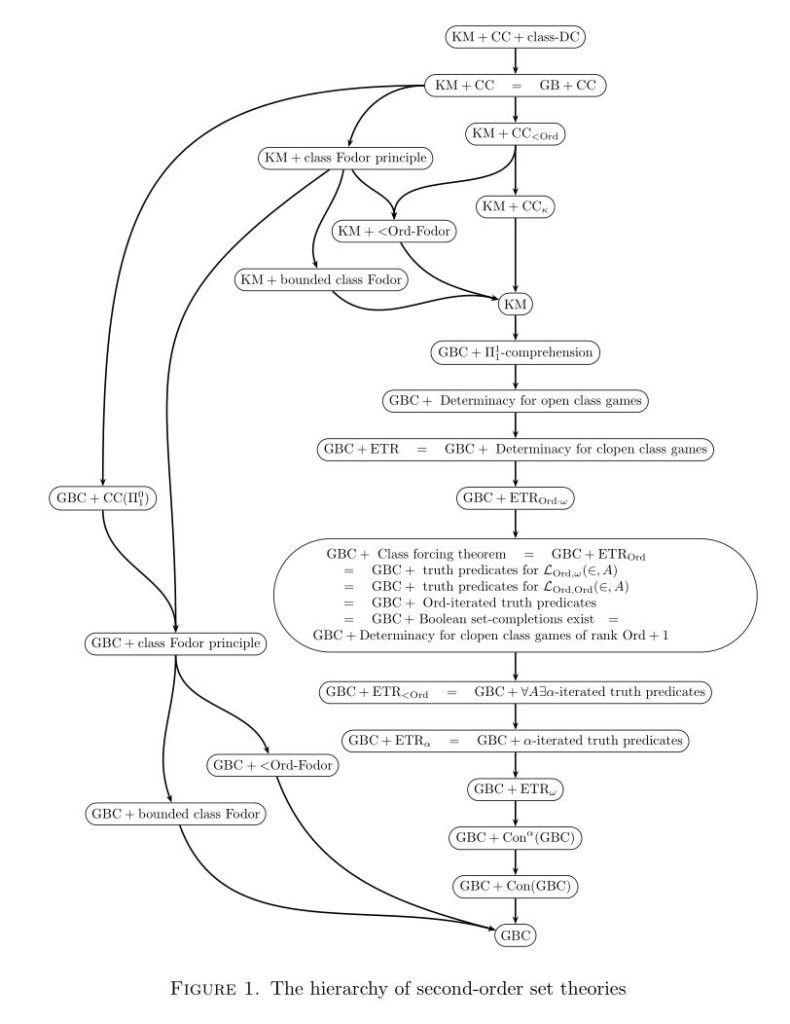-
- [bibtex key=”GitmanHamkinsKaragila:KM-set-theory-does-not-prove-the-class-Fodor-theorem”]
Abstract.
We show that Kelley-Morse (KM) set theory does not prove the class Fodor principle, the assertion that every regressive class functiondefined on a stationary class is constant on a stationary subclass. Indeed, it is relatively consistent with KM for any infinite with that there is a class function that is not constant on any stationary class. Strikingly, it is consistent with KM that there is a class , such that each section contains a class club, but is empty. Consequently, it is relatively consistent with KM that the class club filter is not -closed.
The class Fodor principle is the assertion that every regressive class function
If one tries to prove the class Fodor principle by adapting one of the classical proofs of the first-order Fodor’s lemma, then one inevitably finds oneself needing to appeal to a certain second-order class-choice principle, which goes beyond the axiom of choice and the global choice principle, but which is not available in Kelley-Morse set theory. For example, in one standard proof, we would want for a given
Thus, the class Fodor principle, and consequently also the normality of the class club filter, is provable in the relatively weak second-order set theory
But meanwhile, although the class choice principle is weak in consistency strength, it is not actually provable in KM; indeed, even the weak fragment
Indeed, it follows similarly from arguments of the third author in his dissertation that if
In this article, adapting the ideas of Karagila to the second-order set-theoretic context and using similar methods as in Gitman and Hamkins’s previous work on KM, we shall prove that every model of KM has an extension in which the class Fodor principle fails in that strong sense: there can be a class function
Main Theorem. Kelley-Morse set theory KM, if consistent, does not prove the class Fodor principle. Indeed, if there is a model of KM, then there is a model of KM with a class function
We shall also investigate various weak versions of the class Fodor principle.
Definition.
- For a cardinal
- The class
- The bounded class Fodor principle asserts that every regressive class function
- The very weak class Fodor principle asserts that every regressive class function
We shall separate these principles as follows.
Theorem. Suppose KM is consistent.
- There is a model of KM in which the class Fodor principle fails, but the class
- There is a model of KM in which the class
- There is a model of KM in which the class
Finally, we show that the class Fodor principle can neither be created nor destroyed by set forcing.
Theorem. The class Fodor principle is invariant by set forcing over models of
Let us conclude this brief introduction by mentioning the following easy negative instance of the class Fodor principle for certain GBC models. This argument seems to be a part of set-theoretic folklore. Namely, consider an
Read more by going to the full article: [bibtex key=”GitmanHamkinsKaragila:KM-set-theory-does-not-prove-the-class-Fodor-theorem”]



